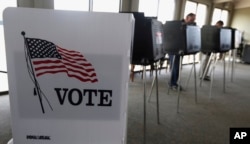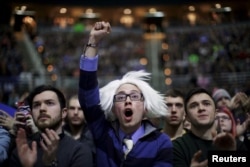The current generation of American voters between the ages of 18 and 35, known as millennials, has emerged as a key part of the nation's electorate in the months before the U.S. presidential election. It’s a demographic that some analysts say could have the power to decide who will win, but that depends on whether they actually turn out to vote.
In past elections, millennials have been on the lower end when it comes to voter turnout. Expectations for the upcoming election appear uncertain, with negative approval ratings of both presumptive presidential nominees and the defeat of Vermont Senator Bernie Sanders, the Democratic candidate that drew the most support from millennials.
Still, Beatriz Cuartas, deputy director of George Washington University’s graduate political management program, has faith that millennials, whose population now is nearly on par with that of baby boomers (those born between 1946 and 1964), understand the importance of going to the polls.
“I know that millennials are trustworthy and they will do the right things for their own country, because whatever happens now, it’s their future,” said Cuartas.
Cuartas said her major concern lies with the increasing polarization of the political parties. In a time when parties are highly divided, she hopes millennials will be driven to the polls in search of the right candidate to support.
“We want to trust in our political system,” she said, “and that’s why millennials are there. They’re making sure that we do what is right.”
Cuartas said millennials already are making an impact on this election through social media. Whether it’s on Facebook, Twitter, YouTube or Snapchat, students are “helping decide the election.”
Whether they turn their voices into ballots in November, however, is another thing entirely for Sanders supporter and millennial Jake Stevens, 26.
After Bernie, what now?
As an active member of a grass-roots campaign called D.C. for Bernie, Stevens has been a vocal advocate for the 74-year-old senator through campaign organizing. For Stevens, Sanders was something he had never seen before in American politics.
“I just said, ‘Oh, wow, this guy stands for what I believe in and I’m not just holding my nose and choosing the lesser of two evils.' … [He’s] actually someone I could more wholeheatedly support,” Stevens said.
Stevens’ attitude is fairly common among young voters. In Iowa, Sanders drew support from an overwhelming 84 percent of voters under 30, compared with Democratic candidate Hillary Clinton’s 14 percent. Meanwhile, presumptive Republican nominee Donald Trump has a lower percentage of support in the 18-35 age group than any other recent presidential candidate of his party.
Sanders’ absence from the race could mean the absence of the large group of millennial voters who supported him.
“There’s a distinction between actively offering support where you’re sending money and you’re volunteering, [and] then there’s actually your voting behavior when you go to the polls,” said Stevens.
He said Sanders supporters who go to the polls could cast protest votes, if they don't switch their allegiance to Clinton. They might write in Sanders' name or choose Green Party nominee Jill Stein.
“We’re out there and not accepting these as the only two options,” Stevens said. Activists have taken to Twitter with a “#JillnotHill” hashtag to show their objection to Clinton.
Former Sanders followers also have the option to throw their support behind Libertarian party candidate Gary Johnson, a former New Mexico governor.
Lesser of two evils
For Stevens, it’s clear that Clinton is the less disastrous choice when compared with Trump, but he still is voting for Stein. Stevens, who will vote in New York, said he is not worried that his protest vote will be be a vote for Trump, since the state traditionally favors the Democratic candidate.
But what’s left for young voters to decide in one of the most controversial elections in history?
According to some millennials, it’s their future. Afshan Mizrahi, 23, says she’s definitely voting in November, as are many of the millennials she’s spoken to about the election.
“A lot of changes are going to affect us, so it’s important we have a say in what’s going to happen,” said Mizrahi.
Some wish they had better options available, but they still are planning to turn out in the fall.














